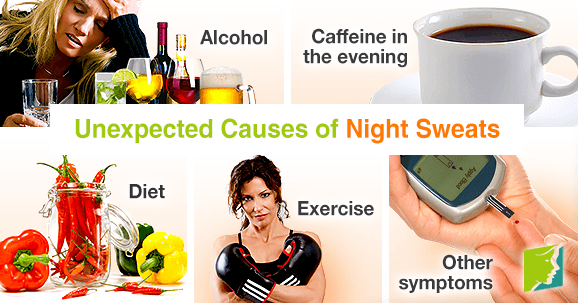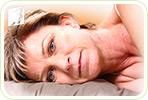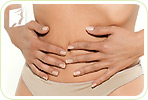"Night sweats," a term used to describe an excessive production of sweat during the night, is a common menopause symptom typically caused by hormone fluctuations. Night sweating can feel unhygienic and disrupt sleeping patterns, often resulting in fatigue. However, there are other contributing factors apart from menopause that can also trigger night sweats. Read on to learn more about some of these unexpected causes.
Alcohol
The body metabolizes alcohol at a certain rate, so excessive drinking means that instead of absorbing molecules, the body looks for other ways to flush alcohol from the system. This is partly done by sweating. Alcohol increases body temperature so that blood vessels dilate and secrete alcohol via the sweat glands. This is why your sweat may smell like alcohol if you have been drinking heavily during the evening. If you're consuming alcohol, stop an hour before going to bed and drink plenty of water to flush the alcohol via urination rather than the sweat glands during the night.
Caffeine in the Evening
Caffeine and sugar both trigger an increase in body temperature, which causes the body to react to cool down by producing sweat. Consuming drinks like coffee or soda in the evening is therefore likely to increase the risk of experiencing night sweats and - given that both are stimulants - could prevent you from sleeping soundly. If you enjoy a hot drink before going to bed, you could try drinking sage tea as an alternative, since it has sweat-reducing properties.
Diet
Eating spicy foods, such as curries or chili, causes an increase in body temperature and can trigger night sweats if done in the evening. It's also important to note that eating a big meal just before going to bed does not allow your body sufficient time to metabolize it. Food left in the stomach can cause night sweating.
Exercise
Exercising before bed increases body temperature, increasing the likelihood of night sweats. What's more, changes to your usual exercise routine may impact the frequency of night sweats. If you increase the intensity of your workouts, the thyroid releases more hormones to fuel the extra exertion. This influx of hormones may affect pre-existing hormonal imbalances brought on by menopause, and therefore intensify night sweats. Try to exercise during the daytime, and if you plan to increase the intensity of your exercise, do so slowly to allow your body time to adjust to extra activity.
Other Symptoms
Though night sweats are commonly experienced as a menopause symptom, other conditions - such as diabetes, cancer, and tuberculosis - have been known to trigger sweating during the night. Night sweating is not a condition; it is a symptom, and if you are concerned, it is best to consult with your doctor to rule out serious health problems.
Menopause symptoms can affect you in ways that may be difficult to adjust to. It's important feel confidence as you experience this stage of your life, and this can be difficult if night sweating is stopping you from feeling fresh or disrupting your sleeping patterns. Being aware of other factors that may be increasing the severity of your night sweating means you can make small changes to your lifestyle to help alleviate this symptom and sleep more comfortably, sweat-free.
Sources
- Ciloglu, F. et al. (2005). Exercise intensity and its effects on thyroid hormones. Neuroendocrinology Letters, 6(26), 830-834. Retrieved from http://www.nel.edu/26-2005_6_pdf/NEL260605A14_Ciloglu.pdf
- National Health Service UK. (2015). Menopause - Symptoms. Retrieved February 17, 2016, from http://www.nhs.uk/Conditions/Menopause/Pages/Symptoms.aspx
- National Health Service UK. (2014). Night sweats. Retrieved February 17, 2016, from http://www.nhs.uk/conditions/night-sweats/Pages/Introduction.aspx




